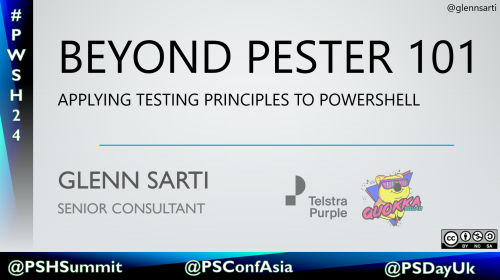Sharing: What’s in it for me!?
Sharing. It’s one of the four pillars of CAMS. We consume so much shared content but have we ever thought about sharing from the point of view of the Sharer? Why should I share? If I’m constantly sharing information what do I get out of it? What’s in it for me!?
This ignite talk looks at sharing through the eyes of a Sharer. What benefits do they receive out of sharing? What cultural or psychological benefits are there?
Transcript
G’day everyone. My name is Glenn Sarti and I’m Senior Software Developer at Puppet, and today I want to talk about Sharing. The term CAMS was first coined by Damon Edwards and John Willis in 2010 and Sharing was one the four pillars.
But, I went back through all of the previous DevOpsDays talks and out of more than 1500, only a handful were about Sharing! In fact the most Sharing focused talk I could find, was by Patrick Debois back in 2012
The topic was
Many devops talks relate to the CAMS acronym. The S for Sharing is usually taken for granted and does not get much explanation, but in this talk it will be right in the centre. Without Sharing there is no Devops and successful adoption is impossible.”
So today I want to help even that score by appealing to your selfish side and answer the question: “Sharing. What’s in it for me?”
And, strangely enough, the most selfish way to share, is not to share with anyone. Instead share with a Rubber Duck!
Rubber ducking is a technique that as you share a problem or idea with the Duck, it helps the solution become clearer. You start talking through a complex problem and mid sentence, bing a light bulb goes off, and the answer just appears! There are many thoughts about why this works but here’s two:
The first, Your mouth is slower than your brain. When you are speaking to your duck, it forces your brain to slow down and process information in depth.
The second, you need to take into account what the Duck knows (Which is nothing) It forces you to think from another point of view and then see other solutions.
So if Rubber Ducking is speaking about a complex problem, what about writing? While speaking and writing are very different tasks they share a common theme: Storytelling. Now I’m not speaking about children’s bedtime stories, or Agile User Stories. I’m talking about telling your story: autobiographical storytelling.
Dr. Sherry Hamby who is a Research Professor of Psychology, at the University of the South, says
I have been surprised at the power of emotional, autobiographical storytelling. (This) means writing about events and people that have mattered to you in your own life–not just describing the facts of your lives.
Research shows that even brief exercises can have substantial impacts on psychological and physical health even months after”
In particular Dr. Hamby says that through this kind of story telling, we can build our resilience to Adversity. She and her research team found four benefits;
Firstly, Finding your voice
This means learning how to express yourself and how to think about what has happened in your life in a way that makes sense. It may appear that events in your life are random, but it doesn’t help to think of them like that. Instead, when we write, we have a beginning, middle and end. We can start to see how experiences, good and bad, have shaped us.
Secondly, Re-affirming your values
Just by writing your story it can show where your focus is and clarify what’s important to you. Also what you choose to leave out or minimise can show what is trivial to you.
Thirdly, Sharing your story
Writing your story is good, but sharing is an under-appreciated aspect of storytelling. When you share your story and pass on wisdom you realise your words can be a positive power on other people
and Lastly, Building resilience
Once you have found your voice, re-affirmed your values and shared your story, it builds a sense of well-being, which then builds resilience for when adversity next strikes. Resilience is strengthened by recognizing that we are all experts in our own lives and we all have something to share with others.
So how do you start writing stories then? It’s quite possible you’re already doing this.
If you have a blog, I’m sure you’re writing stories you want to tell, that matter to you, about problems you overcame. Or perhaps at your job you’ve written a post-mortem for an outage. While they tend be less emotional, they are still autobiographical stories, and are definitely rooted in adversity!
So to answer: Sharing, what’s in it for me? Solving my own problems, thinking from other people’s perspectives, increasing my resilience and mental health! Sounds great doesn’t it!!!
So as we move into Open Spaces and maybe start sharing our own stories, I’d like to leave you a final thought from the poet James Russell Lowell,
Not what we give, but what we share.
For DevOps without the sharer will go nowhere.
Thankyou.
Tweets
\@GlennSarti taking about ducks (and sharing) at #DevOpsDays Seattle! pic.twitter.com/1GTB7wO0py
— Bill Weiss (@BillWeiss) April 26, 2017
Let's build a better devops community by sharing 🤓 @GlennSarti #devops #community #sharethelove #devopsdays #seattle #nerdlife pic.twitter.com/oXGoMgtRDD
— Oliver Sindayigaya (@o_sindayigaya) April 26, 2017
Sharing is storytelling and it helps us work out complex problems. @GlennSarti #devopsdays "Sharing: What's In It For Me" pic.twitter.com/XPbicsRFzI
— aaron aldrich (@crayzeigh) April 26, 2017
@GlennSarti with a great talk on Sharing #CAMS pic.twitter.com/sGjU5VKnhU
— Scott Nasello (@scottnasello) April 26, 2017





Comments